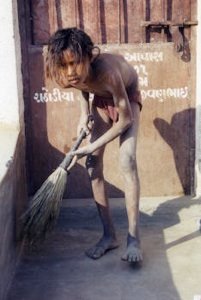No temple entry for dalits in Gujarat (Times of India)
“In a first-of-its-kind study on a large scale, representing 98,000 Dalits across 1,655 villages in Gujarat, it comes out that 97% respondents feel they have ‘no entry’ at certain places in their own villages, including a temple or where a religious ceremony is taking place. [...]
“‘This is the first study on such a large sample size and we covered 99 forms of untouchability that are still practised in villages. There are 12,500 villages in Gujarat where Dalits live. We have covered 1,655 of these villages and around 11 per cent of the total Dalit population,’ says Manjula Pradeep, director of Navsarjan Trust.
“During the study, the researchers did not find a single village where no form of untouchability is practised, giving an unnerving idea about the extent of the problem in a state which is home to Mahatma Gandhi.”
See also:
Vibrant Gujarat? 98% Dalits have to drink tea in separate cups (Times of India, December 8, 2009):
“Bhikhabhai Solanki, 50, a native of Lodariyal village, has never shaken hands with non-Dalits in his life. Bhikhabhai, an agricultural labourer, is Valmiki by caste—the lowest of the socially downtrodden. ‘We are untouchables and nobody touches us here,’ he says.
“The farmer he works for keeps a tea-cup outside his house. Whenever Bhikhabhai arrived for work in the morning or leaves after finishing in the evening, tea is poured into the cup. Strangely, this form of untouchability goes in the name of religion. These cups are called ‘Ram patra’. [...]
“In Lodariyal, Dalit women can't touch vegetables at the shop just to sample them. Only once they pay up, and the money is kept on the side and not handed over, the vegetables are flung into the hollow of their saree. The tea stall owner gives tea to Dalits only in disposable plastic cups. Others get it in ceramic cups.”
And see:
Dalit kids shamed at mid-day meals (Times of India, December 9, 2009):
“As per the 'Census on Untouchability', a study representing 98,000 Dalits across 1,655 villages in Gujarat, 53.78% Dalit children studying in primary schools are discriminated against in mid-day meals.
“‘We are made to sit separately during the lunch hour,’ says Vijay Sitapara, 9, who belongs to the Valmiki caste, the lowest of the socially downtrodden. Vijay, who studies in class IV at the government primary school in Modhvana, says schoolmates from other castes avoid having food with them.
“While other backward class children would still have food, though seated separately from the Dalits, higher caste pupils stay away altogether from mid-day meals at this school because the food is cooked by a Dalit. ‘I come from a Dalit family. Naturally, higher caste members will not eat what I cook,’ says Gauri Vankar.
“Even as the syllabus teaches equality, students learn lessons in untouchability in practice. All Dalit students are forbidden from participating in cultural events. Valmikis have to also clean up school toilets. Dharmendra Sitapara cleaned up the toilets since he was in class IV. Now, he is in high school which has a sweeper.”
Read the full report:
Understanding Untouchability: A Comprehensive Study of Practices and Conditions in 1589 Villages (Navsarjan Trust and The Robert F. Kennedy Center for Justice & Human Rights)

Comments